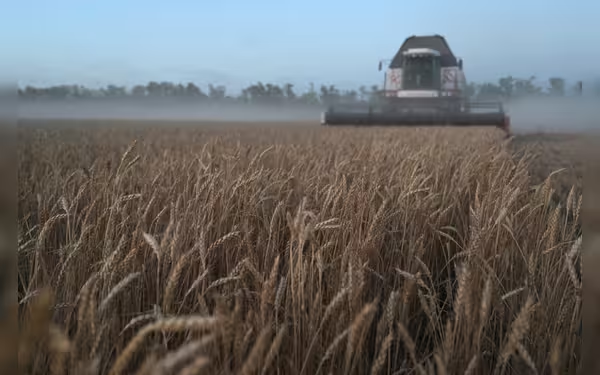Saturday, November 16, 2024 05:28 PM
Russia's Grain Harvest Decline Due to Ukraine Conflict and Weather Challenges
- Russia's grain harvest projected at 132 million metric tons.
- Conflict and weather conditions severely impact agricultural output.
- Kursk region faces significant crop damages and unharvested land.
 Image Credits: arabnewspk
Image Credits: arabnewspkRussia's grain harvest faces a significant decline due to the Ukraine conflict and adverse weather, impacting global food supply chains.
MOSCOW: The ongoing conflict between Russia and Ukraine has had significant repercussions on agricultural production, particularly in grain harvests. As the world’s leading wheat exporter, Russia is facing challenges that threaten its grain output due to both military actions and adverse weather conditions.
According to Agriculture Minister Oksana Lut, the grain harvest for this year is projected to be around 132 million metric tons. This figure represents an 11 percent decrease from the previous year’s harvest of 148 million tons and a staggering 16 percent drop from the record 158 million tons harvested in 2022. The situation has worsened due to a combination of early spring frosts, drought, and excessive rainfall affecting various grain-producing regions.
Recent assessments by the IKAR consultancy suggest that the actual grain harvest may be even lower, estimating it at 124.5 million tons. This decline in expected yield has led to increased international wheat prices, which reached a four-month high last week. Lut emphasized the importance of accurately calculating the harvest figures, particularly in light of the severe weather conditions in Siberia.
Moreover, the conflict has directly impacted the ability to harvest crops in regions where a counter-terrorist operation regime has been implemented. This regime was introduced in Kursk, Bryansk, and Belgorod regions following a significant Ukrainian incursion into Kursk on August 6. These areas, known for their substantial grain production, have become frequent targets of military actions, further complicating the harvest process.
Kursk Governor Alexei Smirnov reported that the aftermath of the attack has left approximately 160,000 hectares of grain unharvested, with damages estimated at nearly $1 billion. This situation highlights the severe economic implications of the ongoing conflict, not just for Russia but for global food supply chains as well.
As the harvest season progresses, Lut indicated that the final estimates for this year’s grain output will be revealed on October 10. As of October 1, Russian farmers had managed to harvest 111 million metric tons of grain, but the outlook remains grim. The sowing of winter crops is also facing difficulties due to persistent drought conditions, with no rain expected in the affected areas until mid-October.
In Lut's words, "The sowing is going very hard. We plan to sow 20 million hectares, as we did last year. But we are practically sowing in sand." This statement underscores the challenges farmers are currently facing, as they strive to maintain production levels amidst a backdrop of conflict and climate-related issues.
The intersection of war and weather is creating a perfect storm for Russia’s grain harvest. As the situation evolves, it is crucial for stakeholders in the agricultural sector to monitor these developments closely. The implications of a reduced grain harvest extend beyond Russia’s borders, potentially affecting global food prices and availability. Understanding these dynamics is essential for anyone interested in the future of food security worldwide.













